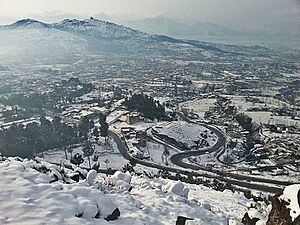Mansehra facts for kids
Quick facts for kids
Mansehra
|
|
|---|---|
|
City
|
|

Mansehra after winter snowfall
|
|
| Country | |
| Province | |
| District | Mansehra |
| Tehsil | Mansehra |
| Elevation | 1,088 m (3,570 ft) |
| Population
(2017)
|
|
| • Total | 127,623 |
| • Density | 340/km2 (900/sq mi) |
| Demonym(s) | Mansehri or Mansehrian |
| Time zone | UTC+5 (PST) |
| Postal Code |
21300
|
Mansehra is a city in the Hazara Division of Khyber Pakhtunkhwa province, Pakistan. It is the 71st largest city in Pakistan by population. It is also the 7th largest city in its province. Mansehra serves as the main city for its district and tehsil (a type of administrative area).
Contents
History of Mansehra
Ancient Times in Mansehra
The area around Mansehra has been lived in for a very long time. People called early Indo-Aryans settled here around 3000 BC. Later, it became part of the ancient kingdoms of Gandhara and the Mauryan Empire.
A famous ruler named Ashoka governed this area as a prince around 272 BCE. He made Mansehra an important center of his government. You can still see his laws, called the Edicts of Ashoka, carved into three large rocks near the city. These carvings are some of the oldest writings found in this part of the world. They are written from right to left in a script called Kharosthi.
After the Mauryans, other kingdoms ruled, including the Kushans. Their most famous ruler was Kanishka the Great. During this time, Buddhist art and buildings became very popular in the area.
Medieval Period in Mansehra
The Uḍi Śāhis were the last big dynasty (ruling family) in Gandhara before Muslim armies arrived. They were known for their impressive coins and buildings, and they built many temples in the region. They controlled the area until they were defeated in 1001.
The region was first known as Pakhli. It got the name Hazara after an invasion in 1399 by Timur. He gave the land to his local leaders, the Hazara-i-Karlugh, which is where the name Hazara Division comes from.
Hazara was part of the Mughal Empire until the early 1700s. After that, the area became divided among many small tribal leaders. This continued until the Sikhs conquered the region in 1818.
Modern Era of Mansehra
Hari Singh Nalwa, a Sikh commander, took control of the Hazara region in 1818. He ruled Hazara from a new city he built, called Haripur. After his death in 1837, Mahan Singh Hazarawala became the new ruler. He is the one who founded the modern city of Mansehra.
People tried to rise up against the Sikh rule, but they were not successful. The Sikhs remained in power until 1849, when the area came under British rule.
The British East India Company took over Mansehra after defeating the Sikhs in 1846. The British divided the Hazara region into three administrative areas called tehsils: Mansehra, Abbottabad, and Haripur. Hazara was part of the Punjab province until 1901. Then, the British created a new province called the North West Frontier Province (NWFP), and Hazara became part of it. In the early 1900s, Mansehra was a small town with about 5,000 people.
After Pakistan became independent in 1947, Hazara district was made a division in 1976. In the same year, Mansehra Tehsil became a district, and Mansehra city became its main headquarters.
How Mansehra is Organized
Mansehra City is the administrative center for both the Mansehra District and the Mansehra Tehsil. The city is divided into four main administrative units called Union Councils. These are Mansehra City Wards 1 to 4 and a rural/suburban area. Each union council is further divided into smaller neighborhoods called Mohallas.
Cultural Festivals in Mansehra
Mansehra is home to the Mansehra Shiva Temple. This temple is famous for its yearly Shivarathri festival, which is a Hindu celebration.
During the festival of Durgashtami, about 400 local Hindu people gather on Bareri Hill to worship Devi (a Hindu goddess). Offerings are made by a priest from Mansehra. This gathering lasts for only one day. The site is very old, as the famous Ashoka Edicts are carved into boulders at the base of Bareri Hill.
Gallery
See also
 In Spanish: Mansehra para niños
In Spanish: Mansehra para niños




